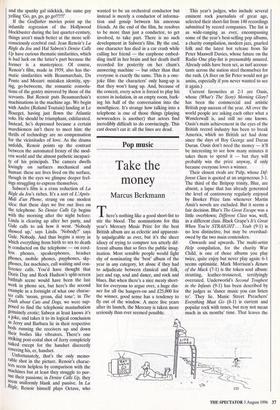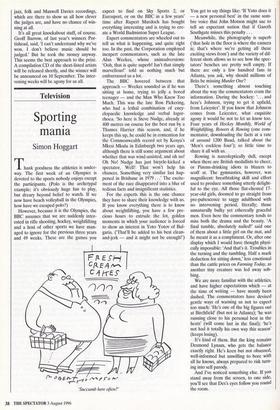Pop music
Take the money
Marcus Berkmann
There's nothing like a good short-list to stir the blood. The nominations for this year's Mercury Music Prize for the best British album are as eclectic and apparent- ly unjudgeable as ever, but it's the sheer idiocy of trying to compare ten utterly dif- ferent albums that so fires the public imag- ination. Most sensible people would fight shy of nominating the 'best' album of the year in any category, let alone if they had to adjudicate between classical and folk, jazz and rap, soul and dance, and rock and blues. But when there's a nice meaty short- list for everyone to argue over, a huge din- ner for all the hangers-on and £25,000 for the winner, good sense has a tendency to fly out of the window. A mere five years after its launch, the Mercury is taken more seriously than ever seemed possible.
This year's judges, who include several eminent rock journalists of great age, selected their short-list from 140 recordings submitted by record companies. The list is as wide-ranging as ever, encompassing some of the year's best-selling pop albums, a charity compilation, modern jazz, gnarled folk and the latest hot release from Sir Peter Maxwell Davies, whose future on the Radio One play-list is presumably assured. Already odds have been set, as turf accoun- tants across the nation steel themselves for the rush. (A fiver on Sir Peter would not go amiss, especially if you never wanted to see it again.) Current favourites at 2-1 are Oasis, whose (What's The Story) Morning Glory? has been the commercial and artistic British pop success of the year. All over the world people are asking each other what a Wonderwall is, and still no one knows. Oasis's main achievement in the eyes of the British record industry has been to break America, which no British act had done since the days of Boy George and Duran Duran. Oasis don't need the money — it'll be interesting to see how many minutes it takes them to spend it — but they will probably win the prize anyway, if only because everyone loves a winner.
Their closest rivals are Pulp, whose Dif- ferent Class is quoted at an ungenerous 3-1. The third of the Britpop trinity, Blur, are absent, a lapse that has already generated the level of controversy regularly enjoyed by Booker Prize fans whenever Martin Amis's novels are excluded. But it seems a fair decision. Blur's The Great Escape was a little overblown; Different Class was, well, in a different class. Black Grape's It's Great When You're STRAIGHT . . . Yeah (9-1) is no less distinctive, but may be overshad- owed by the two main contenders.
Onwards and upwards. The multi-artist Help compilation, for the charity War Child, is one of those albums you play twice, quite enjoy but never play again: 6-1 seems optimistic. Mark Morrison's Return of the Mack (7-1) is the token soul album: strutting, leather-trousered, terrifyingly overrated. Underworld's Second Toughest in the Infants (9-1) has been described by the judges as 'dance music you can listen to'. They lie. Manic Street Preachers' Everything Must Go (8-1) is current and popular rock with tunes, but may not mean much in six months' time. That leaves the jazz, folk and Maxwell Davies recordings, which are there to show us all how clever the judges are, and have no chance of win- ning at all.
It's all great knockabout stuff, of course. Geoff Barrow, of last year's winners Por- tishead, said, 'I can't understand why we've won. I don't believe music should be judged.' But he took the money anyway. This seems the best approach to the prize. A compilation CD of the short-listed artists will be released shortly, and the winner will be announced on 10 September. The inter- vening weeks will be agony for us all.



















































 Previous page
Previous page